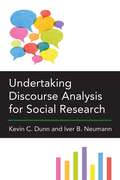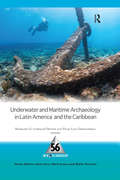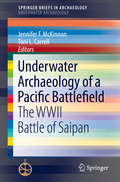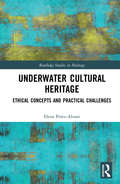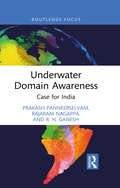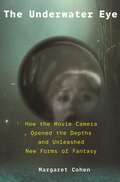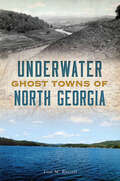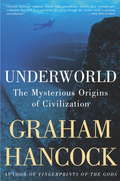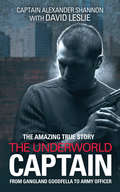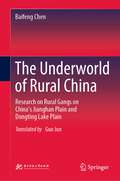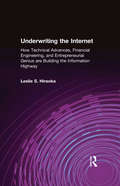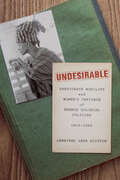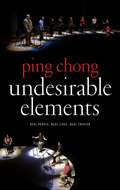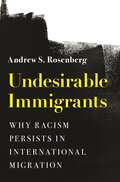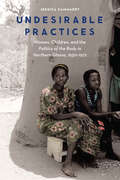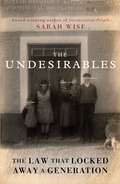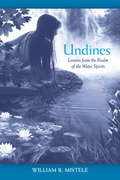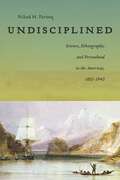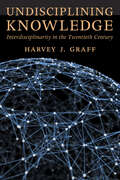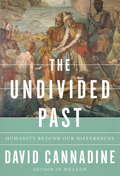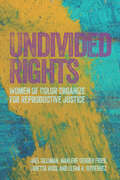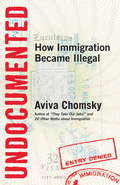- Table View
- List View
Undertaking Discourse Analysis for Social Research
by Kevin C. Dunn Iver B. NeumannKevin C. Dunn and Iver B. Neumann offer a concise, accessible introduction to discourse analysis in the social sciences. A vital resource for students and scholars alike, Undertaking Discourse Analysis for Social Research combines a theoretical and conceptual review with a "how-to" guide for using the method. In the first part of the book, the authors discuss the development of discourse analysis as a research method and identify the main theoretical elements and epistemological assumptions that have led to its emergence as one of the primary qualitative methods of analysis in contemporary scholarship. Then, drawing from a wide-range of examples of social science scholarship, Dunn and Neumann provide an indispensable guide to the variety of ways discourse analysis has been used. They delve into what is gained by using this approach and demonstrate how one actually applies it. They cover such important issues as research prerequisites, how one conceives of a research question, what "counts" as evidence, how one "reads" the data, and some common obstacles and pitfalls. The result is a clear and accessible manual for successfully implementing discourse analysis in social research.
Underwater and Maritime Archaeology in Latin America and the Caribbean (One World Archaeology Ser. #56)
by Margaret E. Leshikar-Denton Pilar Luna ErreguerenaThe waters of Latin America and the Caribbean are rich with archaeological sites, including coastal settlements, defensive forts, freshwater sources, fishing-related activities, navigational aids, anchorages, harbours, ports, shipbuilding sites, shipwrecks and survivor camps. Tragically, treasure-hunting has had a deep impact on these maritime cultural resources, especially on shipwrecks. In the last 20 years, archaeologists have been fighting the battle against these treasure hunters in an attempt to preserve these resources as a source of cultural heritage, rather than allow them to be viewed solely as a means for financial reward. Case studies written primarily by Latin American and Caribbean archaeologists demonstrate exciting and cutting edge research, conservation, site preservation, and interpretation. As a result, this groundbreaking book documents the emerging research interests of maritime archaeologists in Latin America and the Caribbean.
Underwater Archaeology of a Pacific Battlefield
by Jennifer F. Mckinnon Toni L. CarrellBattlefields have been the object of fascination for millions of tourists and the subjects of elaborate interpretation projects. This volume will outline the process and results of developing the WWII Maritime Heritage Trail: Battle of Saipan Project. This book will provide examples of how a group of archaeologists, managers and a community took a specific battle and transformed it from a collection of unknown archaeological sites into a comprehensive storied battlescape that reflects the individuals and actions of those who were involved. It will provide an in-depth view of current maritime archaeological research on submerged battlefield sites, the development of a WWII battlefield maritime heritage trail, as well as the problems and solutions of such an effort. It will cover subjects such as: -heritage and dark tourism-conflict or battlefield archaeology-public interpretation, and community engagement. This volume will serve as a practical review of a project influenced by a range of complementary areas of study and inclusive of many stakeholders, from the public to the professional and beyond. It provides an example of a balanced approach towards research and interpreting archaeological sites through the identification and inclusion of the various stakeholders (professional and community) and an awareness of what was being included, ignored, or inadequately represented in the research and interpretation.
Underwater Cultural Heritage: Ethical concepts and practical challenges
by Elena Perez-AlvaroUnderwater Cultural Heritage investigates cases of underwater cultural heritage, exploring ethical issues that have never been studied before. A vast cultural heritage lies beneath the sea, including the archaeological remains of more than three million vessels, as well as historic monuments and whole cities. In addition, climate change, population growth and current events around the world mean that new underwater cultural heritage is being created faster than ever before. It is, therefore, essential that the ethical issues related to the management of such heritage are considered now, especially as decisions made now will bestow the heritage with a value and will establish legal frameworks that could be used either to protect or harm underwater heritage in the future. Considering a range of challenges related to underwater cultural heritage - including preservation, management, use, sustainability, valuation, politics, identity, human rights, and intangible heritage - the book presents case studies that both illustrate the key ethical issues and also offer possible solutions to help navigate such challenges. The book will also explore the various legislative instruments protecting underwater cultural heritage and emphasise the importance of revising and updating legal frameworks, whilst also taking into account ethical concerns that may expose cultural heritage to more serious menaces. Underwater Cultural Heritage draws on case studies from around the globe and, as such, should be of great interest to academics, researchers and students working in heritage studies, archaeology, history, politics and sustainability. It should also be appealing to heritage practitioners and policymakers who want to learn more about the issues surrounding not only management of underwater cultural heritage but management of cultural heritage in general.
Underwater Cultural Heritage and International Law
by Sarah DromgooleThe UNESCO Convention on the Protection of the Underwater Cultural Heritage 2001, which entered into force internationally in 2009, is designed to deal with threats to underwater cultural heritage arising as a result of advances in deep-water technology. However, the relationship between this new treaty and the UN Convention on the Law of the Sea is deeply controversial. This study of the international legal framework regulating human interference with underwater cultural heritage explores the development and present status of the framework and gives some consideration to how it may evolve in the future. The central themes are the issues that provided the UNESCO negotiators with their greatest challenges: the question of ownership rights in sunken vessels and cargoes; sovereign immunity and sunken warships; the application of salvage law; the ethics of commercial exploitation; and, most crucially, the question of jurisdictional competence to regulate activities beyond territorial sea limits.
Underwater Domain Awareness: Case for India
by Prakash Panneerselvam Rajaram Nagappa R N GaneshThis book presents a comprehensive analysis of the emerging underwater challenges facing India in the Indian Ocean region. With major economic powers like China, the United States, and Russia modernising their submarine fleets and building advanced unmanned underwater vessels to enhance surveillance capabilities, the competition in the Indo-Pacific underwater domain has intensified. The book · Focuses on the issues of detecting, tracking, and classifying submarines/underwater drones in the Indian Ocean. · Examines the Indian Navy’s present anti-submarine warfare (ASW) capabilities in combating underwater threats and discusses the scope for inter-agency, inter-departmental cooperation framework to monitor the undersea activity in the region. · Studies the naval composition and strengths of India and other countries in the neighbourhood and reviews maritime domain awareness practices employed by leading navies including NATO for submarine detection. · Assesses the technology development efforts to deal with these challenges and brings out recommendations. An expert study of undersea surveillance, this book will be indispensable to students and researchers of military and strategic studies, defence studies, critical security, conflict resolution, intelligence studies, and security studies. It will also be of interest to governments, naval establishments, think tanks, and public policy institutes.
The Underwater Eye: How the Movie Camera Opened the Depths and Unleashed New Realms of Fantasy
by Margaret CohenA rich history of underwater filmmaking and how it has profoundly influenced the aesthetics of movies and public perception of the oceansIn The Underwater Eye, Margaret Cohen tells the fascinating story of how the development of modern diving equipment and movie camera technology has allowed documentary and narrative filmmakers to take human vision into the depths, creating new imagery of the seas and the underwater realm, and expanding the scope of popular imagination. Innovating on the most challenging film set on earth, filmmakers have tapped the emotional power of the underwater environment to forge new visions of horror, tragedy, adventure, beauty, and surrealism, entertaining the public and shaping its perception of ocean reality.Examining works by filmmakers ranging from J. E. Williamson, inventor of the first undersea film technology in 1914, to Wes Anderson, who filmed the underwater scenes of his 2004 The Life Aquatic with Steve Zissou entirely in a pool, The Underwater Eye traces how the radically alien qualities of underwater optics have shaped liquid fantasies for more than a century. Richly illustrated, the book explores documentaries by Jacques Cousteau, Louis Malle, and Hans Hass, art films by Man Ray and Jean Vigo, and popular movies and television shows such as 20,000 Leagues Under the Sea, Creature from the Black Lagoon, Sea Hunt, the Bond films, Jaws, The Abyss, and Titanic. In exploring the cultural impact of underwater filmmaking, the book also asks compelling questions about the role film plays in engaging the public with the remote ocean, a frontline of climate change.
Underwater Ghost Towns of North Georgia (Lost Ser.)
by Lisa M RussellAn archeologist reveals the mysterious world that disappeared under North Georgia&’s man-made lakes in this fascinating history. North Georgia has more than forty lakes, and not one is natural. The state&’s controversial decision to dam the region&’s rivers for power and water supply changed the landscape forever. Lost communities, forgotten crossroads, dissolving racetracks and even entire towns disappeared, with remnants occasionally peeking up from the depths during times of extreme drought. The creation of Lake Lanier displaced more than seven hundred families. During the construction of Lake Chatuge, busloads of schoolboys were brought in to help disinter graves for the community&’s cemetery relocation. Contractors clearing land for the development of Lake Hartwell met with seventy-eight-year-old Eliza Brock wielding a shotgun and warning the men off her property. Georgia historian and archeologist Lisa Russell dives into the history hidden beneath North Georgia&’s lakes.
Underworld: The Mysterious Origins of Civilization
by Graham HancockFrom Graham Hancock, bestselling author of Fingerprints of the Gods, comes a mesmerizing book that takes us on a captivating underwater voyage to find the ruins of a lost civilization that's been hidden for thousands of years beneath the world's oceans.While Graham Hancock is no stranger to stirring up heated controversy among scientific experts, his books and television documentaries have intrigued millions of people around the world and influenced many to rethink their views about the origins of human civilization. Now he returns with an explosive new work of archaeological detection. In Underworld, Hancock continues his remarkable quest underwater, where, according to almost a thousand ancient myths from every part of the globe, the ruins of a lost civilization, obliterated in a universal flood, are to be found.Guided by cutting-edge science and the latest archaeological scholarship, Hancock begins his mission to discover the truth about these myths and examines the mystery at the end of the last Ice Age. As the glaciers melted between 17,000 and 7,000 years ago, sea levels rose and more than 15 million square miles of habitable land were submerged underwater, resulting in a radical change to the Earth's shape and the conditions in which people could live. Using the latest computer techniques to map the world's changing coastlines, Hancock finds astonishing correspondences with the ancient flood myths.Filled with thrilling accounts of his own participation in dives off the coast of Japan, as well as in the Mediterranean, the Atlantic, and the Arabian Sea, we watch as Hancock discovers underwater ruins exactly where the myths say they should be--sunken kingdoms that archaeologists never thought existed. Fans of Hancock's previous adventures will find themselves immersed in Underworld, a provocative book that provides both compelling hard evidence for a fascinating, forgotten episode in human history and a completely new explanation for the origins of civilization as we know it.From the Hardcover edition.
The Underworld Captain: From Gangland Goodfella To Army Officer
by Alexander Shannon David LeslieAlexander Shannon escaped a shady past to enjoy a glittering career in the army, only to end up back in the thick of criminal activity.Shannon's time as a soldier saw him posted to the Falklands, Northern Ireland and war-torn Bosnia. The rigours of army life took their toll and he found himself drawn into a series of ruthless gang wars. He used the skills he'd learned in the forces to hide weapons, work for drugs racketeers and plot a massacre, and he was offered a fortune to work as a Mafia-style contract assassin.He was questioned over brutal killings and accused of a triple murder attempt, yet his dedication and determination to succeed in the army brought him accolades and a series of promotions. In The Underworld Captain, Shannon explains how he managed to combine a successful army career with dangerous gangland dealings for so long and how he finally broke free for good.
The Underworld of Rural China: Research on Rural Gangs on China’s Jianghan Plain and Dongting Lake Plain
by Baifeng ChenThis book aims to provide the readers a better understanding of rural China through the particular perspective of the rural underworld. It proposes new concepts to describe social changes of rural China by comparing the contemporary rural society with the acquaintance society—the classic model for depicting the traditional Chinese society. The author’s down-to-earth fieldwork has revealed that, with a permeating gang influence, the society of rural China has actually changed in nature. Such change in social nature is summarized as “the estrangement of acquaintances” or “moral ambiguity”. As a result of the rural gangster’s unlawful acts of lining their pockets with national resources, rural China is going through “rural governance involution.” In short, this book develops new models and concepts to establish a comprehensive scientific conceptual system for explaining social reality. With hard-to-come-by information and a prudent and multi-faceted analysis on a neglected topic, this book gradually reveals to the readers the true picture of rural China.
Underwriting the Internet: How Technical Advances, Financial Engineering, and Entrepreneurial Genius are Building the Information Highway
by Leslie S. HiraokaHe covers the anti-trust case against Microsoft; the successes of eBay, Amazon, Yahoo, and Google; road-kills along the information highway such as the forgotten eToys; as well as the Enron implosion and other corporate scandals. After tracing this amazing story he concludes that the illegal practices and the ensuing USD7 trillion loss in equity markets slowed the Internet revolution but could not snuff it out, and with worldwide economic recovery e-business surges onward.
Undesirable: Passionate Mobility and Women’s Defiance of French Colonial Policing, 1919–1952
by Jennifer Anne BoittinArchival research into policing and surveillance of migrant women illuminates pressing contemporary issues. Examining little-known policing archives in France, Senegal, and Cambodia, Jennifer Anne Boittin unearths the stories of hundreds of women labeled “undesirable” by the French colonial police and society in the early twentieth century. These “undesirables” were often women traveling alone, women who were poor or ill, women of color, or women whose intimate lives were deemed unruly. To refute the label and be able to move freely, they spoke out or wrote impassioned letters: some emphasized their “undesirable” qualities to suggest that they needed the care and protection of the state to support their movements, while others used the empire’s own laws around Frenchness and mobility to challenge state or societal interference. Tacking between advocacy and supplication, these women summoned intimate details to move beyond, contest, or confound surveillance efforts, bringing to life a practice that Boittin terms “passionate mobility.” In considering how ordinary women pursued autonomy, security, companionship, or simply a better existence in the face of surveillance and control, Undesirable illuminates pressing contemporary issues of migration and violence.
Undesirable: Passionate Mobility and Women’s Defiance of French Colonial Policing, 1919–1952
by Jennifer Anne BoittinArchival research into policing and surveillance of migrant women illuminates pressing contemporary issues. Examining little-known policing archives in France, Senegal, and Cambodia, Jennifer Anne Boittin unearths the stories of hundreds of women labeled “undesirable” by the French colonial police and society in the early twentieth century. These “undesirables” were often women traveling alone, women who were poor or ill, women of color, or women whose intimate lives were deemed unruly. To refute the label and be able to move freely, they spoke out or wrote impassioned letters: some emphasized their “undesirable” qualities to suggest that they needed the care and protection of the state to support their movements, while others used the empire’s own laws around Frenchness and mobility to challenge state or societal interference. Tacking between advocacy and supplication, these women summoned intimate details to move beyond, contest, or confound surveillance efforts, bringing to life a practice that Boittin terms “passionate mobility.” In considering how ordinary women pursued autonomy, security, companionship, or simply a better existence in the face of surveillance and control, Undesirable illuminates pressing contemporary issues of migration and violence.
Undesirable: Passionate Mobility and Women’s Defiance of French Colonial Policing, 1919–1952
by Jennifer Anne BoittinArchival research into policing and surveillance of migrant women illuminates pressing contemporary issues. Examining little-known policing archives in France, Senegal, and Cambodia, Jennifer Anne Boittin unearths the stories of hundreds of women labeled “undesirable” by the French colonial police and society in the early twentieth century. These “undesirables” were often women traveling alone, women who were poor or ill, women of color, or women whose intimate lives were deemed unruly. To refute the label and be able to move freely, they spoke out or wrote impassioned letters: some emphasized their “undesirable” qualities to suggest that they needed the care and protection of the state to support their movements, while others used the empire’s own laws around Frenchness and mobility to challenge state or societal interference. Tacking between advocacy and supplication, these women summoned intimate details to move beyond, contest, or confound surveillance efforts, bringing to life a practice that Boittin terms “passionate mobility.” In considering how ordinary women pursued autonomy, security, companionship, or simply a better existence in the face of surveillance and control, Undesirable illuminates pressing contemporary issues of migration and violence.
Undesirable Elements
by Alisa Solomon Ping Chong"The cumulative power of these shared stories is nothing short of astonishing. Ping Chong creates a tremendous tapestry of lives."--Twin Cities Reader This three-piece volume of Undesirable Elements, the community-specific theater works series, examines the lives of those born into one culture but living in another. Each production grows out of an extended residency, during which Ping Chong and his collaborators conduct interviews of community members and then create a script that explores both historical and personal narratives. Ping Chong is a theater director, playwright, choreographer, and video and installation artist. The recipient of two OBIE awards, two Bessie awards, and a Guggenheim Fellowship, he has created more than fifty works for the stage, including twenty-five in his Undesirable Elements series.
Undesirable Immigrants: Why Racism Persists in International Migration (Princeton Studies in International History and Politics #200)
by Andrew S. RosenbergHow the racist legacy of colonialism shapes global migrationThe Immigration and Nationality Act of 1965 officially ended the explicit prejudice in American immigration policy that began with the 1790 restriction on naturalization to free White persons of “good character.” By the 1980s, the rest of the Anglo-European world had followed suit, purging discriminatory language from their immigration laws and achieving what many believe to be a colorblind international system. Undesirable Immigrants challenges this notion, revealing how racial inequality persists in global migration despite the end of formally racist laws.In this eye-opening book, Andrew Rosenberg argues that while today’s leaders claim that their policies are objective and seek only to restrict obviously dangerous migrants, these policies are still correlated with race. He traces how colonialism and White supremacy catalyzed violence and sabotaged institutions around the world, and how this historical legacy has produced migrants that the former imperial powers and their allies now deem unfit to enter. Rosenberg shows how postcolonial states remain embedded in a Western culture that requires them to continuously perform their statehood, and how the closing and policing of international borders has become an important symbol of sovereignty, one that imposes harsher restrictions on non-White migrants.Drawing on a wealth of original quantitative evidence, Undesirable Immigrants demonstrates that we cannot address the challenges of international migration without coming to terms with the brutal history of colonialism.
Undesirable Practices: Women, Children, and the Politics of the Body in Northern Ghana, 1930–1972 (Expanding Frontiers: Interdisciplinary Approaches to Studies of Women, Gender, and Sexuality)
by Jessica CammaertUndesirable Practices examines both the intended and the unintended consequences of “imperial feminism” and British colonial interventions in “undesirable” cultural practices in northern Ghana. Jessica Cammaert addresses the state management of social practices such as female circumcision, nudity, prostitution, and “illicit” adoption as well as the hesitation to impose severe punishments for the slave dealing of females, particularly female children. She examines the gendered power relations and colonial attitudes that targeted women and children spanning pre- and postcolonial periods, the early postindependence years, and post-Nkrumah policies. In particular, Cammaert examines the limits of the male colonial gaze and argues that the power lay not in the gaze itself but in the act of “looking away,” a calculated aversion of attention intended to maintain the tribal community and retain control over the movement, sexuality, and labor of women and children. With its examination of broader time periods and topics and its complex analytical arguments, Undesirable Practices makes a valuable contribution to literature in African studies, contemporary advocacy discourse, women and gender studies, and critical postcolonial studies.
The Undesirables: The Law that Locked Away a Generation
by Sarah WiseThrough the early twentieth century, the British Government locked away over 50,000 innocent people. Their &‘crimes&’? Being poor and unyielding. This is their story. 'The heartrending stories Sarah Wise has unearthed beggar belief… beautifully researched and truly compelling.' Catherine Bailey, author of Black Diamonds By 1950, an estimated 50,000 people had been deemed &‘defective&’ by the British government and detained indefinitely under the 1913 Mental Deficiency Act. Their &‘crimes&’ were various: women with children born out of wedlock; rebellious teenagers caught shoplifting; those with epilepsy, hearing impairments and chronic illnesses who had struggled in school; and many who were simply &‘different&’. Forcibly removed from their families and confined to a shadow world of specialist facilities in the countryside, they were hidden away and forgotten – out of sight, out of mind. Through painstaking archival research, award-winning historian Sarah Wise shines a light on this shameful chapter. Piecing together the lives irrevocably changed by this devastating legislation, The Undesirables provides a compelling study of how early twentieth-century attitudes to class, gender and disability resulted in a nationwide scandal – and how they continue to shape social policy to this day.
Undines: Lessons from the Realm of the Water Spirits
by William R. MisteleUndines-from the Latin root unda, which means “wave”- are water elementals, or spirits of the water world. Like their fellow elementals-salamanders (fire), sylphs (air), and gnomes (earth)-undines are united with, and personify, their element. First mentioned in the alchemical works of medieval botanist Paracelsus, undines appear throughout European folklore. Who are these mysterious creatures of lakes, oceans, and waterfalls? Undines takes readers directly into the water spirits’ realm through stories, personal encounters, and interviews with such luminaries as Istiphul, the undine queen whose presence embodies the magical essence of the feminine. Whether seen as fact or fairy tale, Undines presents archetypal truths and insights into human nature. The powers and abilities that undines display are latent in us all and crucial to humanity’s evolution (or mere survival): harmony with nature, empathy and compassion, a deep capacity to love, and a cooperative rather than combative relationship to the world. Undines will appeal broadly to readers of mythology, fantasy, and fairy tales, particularly to practitioners that work with nature spirits and elemental beings-Druids, Wiccans, pagans, and those interested in magic and mysticism.
Undisciplined: Science, Ethnography, and Personhood in the Americas, 1830-1940 (America and the Long 19th Century #9)
by Nihad FarooqIn the 19th century, personhood was a term of regulation and discipline in which slaves, criminals, and others, could be "made and unmade." Yet it was precisely the fraught, uncontainable nature of personhood that necessitated its constant legislation, wherein its meaning could be both contested and controlled. Examining scientific and literary narratives, Nihad M. Farooq's Undisciplined encourages an alternative consideration of personhood, one that emerges from evolutionary and ethnographic discourse. Moving chronologically from 1830 to 1940, Farooq explores the scientific and cultural entanglements of Atlantic travelers in and beyond the Darwin era, and invites us to attend more closely to the consequences of mobility and contact on disciplines and persons. Bringing together an innovative group of readings--from field journals, diaries, letters, and testimonies to novels, stage plays, and audio recordings--Farooq advocates for a reconsideration of science, personhood, and the priority of race for the field of American studies. Whether expressed as narratives of acculturation, or as acts of resistance against the camera, the pen, or the shackle, these stories of the studied subjects of the Atlantic world add a new chapter to debates about personhood and disciplinarity in this era that actively challenged legal, social, and scientific categorizations.
Undisciplining Knowledge: Interdisciplinarity in the Twentieth Century
by Harvey J. GraffThe first critical history of interdisciplinary efforts and movements in the modern university.Interdisciplinarity—or the interrelationships among distinct fields, disciplines, or branches of knowledge in pursuit of new answers to pressing problems—is one of the most contested topics in higher education today. Some see it as a way to break down the silos of academic departments and foster creative interchange, while others view it as a destructive force that will diminish academic quality and destroy the university as we know it. In Undisciplining Knowledge, acclaimed scholar Harvey J. Graff presents readers with the first comparative and critical history of interdisciplinary initiatives in the modern university. Arranged chronologically, the book tells the engaging story of how various academic fields both embraced and fought off efforts to share knowledge with other scholars. It is a story of myths, exaggerations, and misunderstandings, on all sides.Touching on a wide variety of disciplines—including genetic biology, sociology, the humanities, communications, social relations, operations research, cognitive science, materials science, nanotechnology, cultural studies, literacy studies, and biosciences—the book examines the ideals, theories, and practices of interdisciplinarity through comparative case studies. Graff interweaves this narrative with a social, institutional, and intellectual history of interdisciplinary efforts over the 140 years of the modern university, focusing on both its implementation and evolution while exploring substantial differences in definitions, goals, institutional locations, and modes of organization across different areas of focus.Scholars across the disciplines, specialists in higher education, administrators, and interested readers will find the book’s multiple perspectives and practical advice on building and operating—and avoiding fallacies and errors—in interdisciplinary research and education invaluable.
The Undivided Past
by David CannadineFrom one of our most acclaimed historians, a wise and provocative call to re-examine the way we look at the past: not merely as the story of incessant conflict between groups but also of human solidarity throughout the ages. Investigating the six most salient categories of human identity, difference, and confrontation--religion, nation, class, gender, race, and civilization--David Cannadine questions just how determinative each of them has really been. For while each has motivated people dramatically at particular moments, they have rarely been as pervasive, as divisive, or as important as is suggested by such simplified polarities as "us versus them," "black versus white," or "the clash of civilizations." For most of recorded time, these identities have been more fluid and these differences less unbridgeable than political leaders, media commentators--and some historians--would have us believe. Throughout history, in fact, fruitful conversations have continually taken place across these allegedly impermeable boundaries of identity: the world, as Cannadine shows, has never been simply and starkly divided between any two adversarial solidarities but always an interplay of overlapping constituencies. Yet our public discourse is polarized more than ever around the same simplistic divisions, and Manichean narrative has become the default mode to explain everything that is happening in the world today. With wide-ranging erudition, David Cannadine compellingly argues against the pervasive and pernicious idea that conflict is the inevitable state of human affairs. The Undivided Past is an urgently needed work of history, one that is also about the present--and the future.
Undivided Rights: Women of Color Organizing for Reproductive Justice
by Jael Silliman Loretta Ross Elena Gutiérrez Marlene GerberUndivided Rights captures the evolving and largely unknown activist history of women of color organizing for reproductive justice-on their own behalf.Undivided Rights presents a textured understanding of the reproductive rights movement by placing the experiences, priorities, and activism of women of color in the foreground. Using historical research, original organizational case studies, and personal interviews, the authors illuminate how women of color have led the fight to control their own bodies and reproductive destinies. Undivided Rights shows how women of color--starting within their own Latina, African American, Native American, and Asian American communities-have resisted coercion of their reproductive abilities. Projected against the backdrop of the mainstream pro-choice movement and radical right agendas, these dynamic case studies feature the groundbreaking work being done by health and reproductive rights organizations led by women-of-color.The book details how and why these women have defined and implemented expansive reproductive health agendas that reject legalistic remedies and seek instead to address the wider needs of their communities. It stresses the urgency for innovative strategies that push beyond the traditional base and goals of the mainstream pro-choice movement-strategies that are broadly inclusive while being specific, strategies that speak to all women by speaking to each woman. While the authors raise tough questions about inclusion, identity politics, and the future of women's organizing, they also offer a way out of the limiting focus on "choice."Undivided Rights articulates a holistic vision for reproductive freedom. It refuses to allow our human rights to be divvied up and parceled out into isolated boxes that people are then forced to pick and choose among.
Undocumented
by Aviva ChomskyExplores what it means to be undocumented in a legal, social, economic and historical context In this illuminating work, immigrant rights activist Aviva Chomsky shows how "illegality" and "undocumentedness" are concepts that were created to exclude and exploit. With a focus on US policy, she probes how people, especially Mexican and Central Americans, have been assigned this status--and to what ends. Blending history with human drama, Chomsky explores what it means to be undocumented in a legal, social, economic, and historical context. The result is a powerful testament of the complex, contradictory, and ever-shifting nature of status in America.From the Trade Paperback edition.
